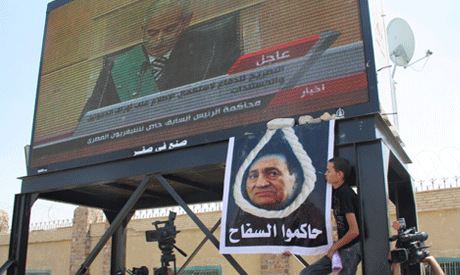
Moubarak trial (Photo by Mai Shaheen)
The Egyptian Cabinet approved Wednesday an amendment to the law on treason. The law was issued in 1952, after the 23 July Revolution, to try those who corrupted political life in Egypt since 1939.
The cabinet approved the law during a Council of Ministers meeting yesterday. Minister of Justice Mohamed El-Guindy said the law is still in effect, since no law was created to cancel it, and that it could be used in the future. El-Guindy said the amendments made were procedural.
The Treason Law is applicable to all public employees, ministers, and anyone who had a seat in either the People's Assembly or the Shura Council, or any local council, as well anyone who held public office.
The law punishes those who “worked to corrupt political life. endangering the welfare of the country or breaking the law.” The law also criminalises the “use of power [by public officials] to get perks for themselves or for someone else from any public authority, company or organisation,” and singles out anyone who tries to influence the work of judges.
Punishments set by the law include banishing perpetrators from public office and annulling their membership in legislative councils. They are also to be banned them from voting or running for office for five years from the day they are sentenced, banned from holding public office for at least five years, and from being a member of any political party also for at least five years. In addition, they are to be forbidden from having private businesses and from claiming their pensions.
Treason courts are made up of a judge from the Court of Cassation, a judge from the Court of Appeals to be appointed by the minister of justice, and four army officers. Treason courts are usually efficient, with judges not allowed to adjourn the case more than twice, and only for one week.
Ever since former president Hosni Mubarak was ousted 11 February, revolutionaries and political activists have been calling for him and his cronies to be tried for political crimes, such as creating political corruption, rigging elections, using their powers to gain benefits, interfering in syndicates, inciting hatred between Muslims and Christians, manipulating policies to favour Israel, and in the case of Mubarak, trying to transfer power to his younger son Gamal.
However, the Egyptian penal code does not include “political crimes,” which led to calls to reactivate the Treason Law that Gamal Abdel Nasser used to try his foes after the 1952 Revolution.
Short link: